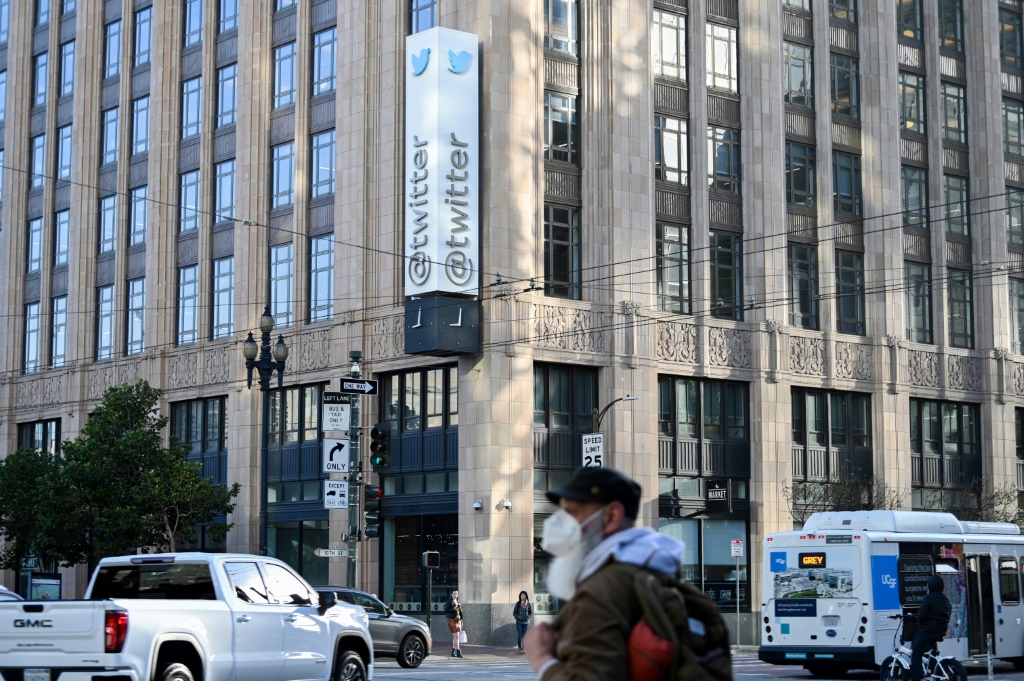SOCIAL
Twitter turmoil, staff exodus aggravate security concerns

The Twitter Headquarters in San Francisco, California. – © AFP Hector RETAMAL
Anuj CHOPRA
Twitter’s owner Elon Musk has pledged the platform will not become a “hellscape,” but experts fear a staff exodus following mass layoffs may have devastated its ability to combat misinformation, impersonation and data theft.
Twitter devolved into what campaigners described as a cesspit of falsehoods and hate speech after recent layoffs cut half the company’s 7,500 staff and fake accounts proliferated following its botched rollout of a paid verification system.
Further throwing the influential platform into disarray – and raising doubt about its very existence – reports said hundreds of employees chose to depart the company on Thursday in defiance of an ultimatum from Musk.
“The huge number of layoffs and resignations raises serious questions about content moderation and the security of user data,” Cheyenne Hunt-Majer, from the nonprofit Public Citizen, told AFP.
“It is imperative that (US regulators) act with urgency as users could have their sensitive data exploited or even stolen given the lack of sufficient staff that remain to adequately protect it.”
The hashtag #RIPTwitter gained huge traction on the site after resignations poured in from employees who chose “no” to Musk’s demand that they either be “extremely hardcore” or exit the company.
Twitter has plunged into turmoil as Musk, a self-professed free speech absolutist, seeks to shake up the money-losing company after his blockbuster $44 billion buyout late last month.
– ‘Debacle’ –
The site’s content moderation teams – largely outsourced contractors that combat misinformation – have been axed and a number of engineers fired after openly criticizing Musk on Twitter or on an internal messaging board, according to reports and tweets.
Wary brands have paused or slowed down ad spending – Twitter’s biggest revenue source – after a spike in racist and antisemitic trolling on the platform.
“Misinformation super spreaders” – or untrustworthy accounts peddling falsehoods — saw a 57 percent jump in engagement in the week after Musk’s acquisition of Twitter, according to a survey by the nonprofit watchdog group NewsGuard.
“Elon Musk has swiftly decimated Twitter’s ability to maintain the platform’s integrity, health and safety,” said Jessica Gonzalez, co-chief executive officer at the nonpartisan group Free Press.
“If there is one lesson that all social-media platforms must take away from this debacle, it’s that without protecting users from hate and lies you have no company at all.”
In a response to critics, Musk on Friday as he indicated a new direction for content moderation on the site.
While not being totally removed from the site, Musk said that “negative/hate tweets” will be “max deboosted (and) demonetized, so no ads or other revenue to Twitter.”
“You won’t find the tweet unless you specifically seek it out, which is no different from rest of Internet,” he added.
But his plan fell on skeptical ears.
– ‘Significant blow’ –
“We could certainly see a spike in misinformation, hate speech, and other objectionable content because of Musk’s latest moves,” Zeve Sanderson, executive director of the New York University’s Center for Social Media and Politics, told AFP.
“Content moderation is a lot harder to do without people around to actually do content moderation.”
In a letter to the Federal Trade Commission, a regulatory agency, a group of Democratic senators blamed Musk for introducing “alarming” new features that undermined safety despite warnings that they would be “abused for fraud, scams and dangerous impersonation.”
“Users are already facing the serious repercussions of this growth-at-all-costs strategy,” they wrote in the letter published Thursday, noting the recent spike in fake accounts impersonating companies, politicians and celebrities.
Among the victims was drugmaker Eli Lilly, whose stock price nosedived — erasing billions in market capitalization — after a parody account stamped with a verification tag purchased for $8 tweeted that insulin was being made available for free.
Last week, Twitter disabled sign-ups for the contentious feature known as Twitter Blue, with reports saying it had been temporarily disabled to help address impersonation issues — but not before several brands took a hit.
Given the apparent vulnerabilities, digital experts have warned activists, particularly in autocratic countries, of the increased risk of identity theft or their private messages falling into the hands of hackers.
“Around the world, Twitter is used to organize against oppression,” said Hunt-Majer.
“If Musk’s mismanagement kills it, that would be a significant blow to freedom of information and, frankly, human rights in general on a global scale.”
SOCIAL
Snapchat Explores New Messaging Retention Feature: A Game-Changer or Risky Move?

In a recent announcement, Snapchat revealed a groundbreaking update that challenges its traditional design ethos. The platform is experimenting with an option that allows users to defy the 24-hour auto-delete rule, a feature synonymous with Snapchat’s ephemeral messaging model.
The proposed change aims to introduce a “Never delete” option in messaging retention settings, aligning Snapchat more closely with conventional messaging apps. While this move may blur Snapchat’s distinctive selling point, Snap appears convinced of its necessity.
According to Snap, the decision stems from user feedback and a commitment to innovation based on user needs. The company aims to provide greater flexibility and control over conversations, catering to the preferences of its community.
Currently undergoing trials in select markets, the new feature empowers users to adjust retention settings on a conversation-by-conversation basis. Flexibility remains paramount, with participants able to modify settings within chats and receive in-chat notifications to ensure transparency.
Snapchat underscores that the default auto-delete feature will persist, reinforcing its design philosophy centered on ephemerality. However, with the app gaining traction as a primary messaging platform, the option offers users a means to preserve longer chat histories.
The update marks a pivotal moment for Snapchat, renowned for its disappearing message premise, especially popular among younger demographics. Retaining this focus has been pivotal to Snapchat’s identity, but the shift suggests a broader strategy aimed at diversifying its user base.
This strategy may appeal particularly to older demographics, potentially extending Snapchat’s relevance as users age. By emulating features of conventional messaging platforms, Snapchat seeks to enhance its appeal and broaden its reach.
Yet, the introduction of message retention poses questions about Snapchat’s uniqueness. While addressing user demands, the risk of diluting Snapchat’s distinctiveness looms large.
As Snapchat ventures into uncharted territory, the outcome of this experiment remains uncertain. Will message retention propel Snapchat to new heights, or will it compromise the platform’s uniqueness?
Only time will tell.
SOCIAL
Catering to specific audience boosts your business, says accountant turned coach

While it is tempting to try to appeal to a broad audience, the founder of alcohol-free coaching service Just the Tonic, Sandra Parker, believes the best thing you can do for your business is focus on your niche. Here’s how she did just that.
When running a business, reaching out to as many clients as possible can be tempting. But it also risks making your marketing “too generic,” warns Sandra Parker, the founder of Just The Tonic Coaching.
“From the very start of my business, I knew exactly who I could help and who I couldn’t,” Parker told My Biggest Lessons.
Parker struggled with alcohol dependence as a young professional. Today, her business targets high-achieving individuals who face challenges similar to those she had early in her career.
“I understand their frustrations, I understand their fears, and I understand their coping mechanisms and the stories they’re telling themselves,” Parker said. “Because of that, I’m able to market very effectively, to speak in a language that they understand, and am able to reach them.”Â
“I believe that it’s really important that you know exactly who your customer or your client is, and you target them, and you resist the temptation to make your marketing too generic to try and reach everyone,” she explained.
“If you speak specifically to your target clients, you will reach them, and I believe that’s the way that you’re going to be more successful.
Watch the video for more of Sandra Parker’s biggest lessons.
SOCIAL
Instagram Tests Live-Stream Games to Enhance Engagement

Instagram’s testing out some new options to help spice up your live-streams in the app, with some live broadcasters now able to select a game that they can play with viewers in-stream.
As you can see in these example screens, posted by Ahmed Ghanem, some creators now have the option to play either “This or That”, a question and answer prompt that you can share with your viewers, or “Trivia”, to generate more engagement within your IG live-streams.
That could be a simple way to spark more conversation and interaction, which could then lead into further engagement opportunities from your live audience.
Meta’s been exploring more ways to make live-streaming a bigger consideration for IG creators, with a view to live-streams potentially catching on with more users.
That includes the gradual expansion of its “Stars” live-stream donation program, giving more creators in more regions a means to accept donations from live-stream viewers, while back in December, Instagram also added some new options to make it easier to go live using third-party tools via desktop PCs.
Live streaming has been a major shift in China, where shopping live-streams, in particular, have led to massive opportunities for streaming platforms. They haven’t caught on in the same way in Western regions, but as TikTok and YouTube look to push live-stream adoption, there is still a chance that they will become a much bigger element in future.
Which is why IG is also trying to stay in touch, and add more ways for its creators to engage via streams. Live-stream games is another element within this, which could make this a better community-building, and potentially sales-driving option.
We’ve asked Instagram for more information on this test, and we’ll update this post if/when we hear back.
-

 SEARCHENGINES6 days ago
SEARCHENGINES6 days agoGoogle Core Update Volatility, Helpful Content Update Gone, Dangerous Google Search Results & Google Ads Confusion
-

 SEO6 days ago
SEO6 days ago10 Paid Search & PPC Planning Best Practices
-

 MARKETING7 days ago
MARKETING7 days ago2 Ways to Take Back the Power in Your Business: Part 2
-

 MARKETING5 days ago
MARKETING5 days ago5 Psychological Tactics to Write Better Emails
-

 SEARCHENGINES5 days ago
SEARCHENGINES5 days agoWeekend Google Core Ranking Volatility
-

 MARKETING6 days ago
MARKETING6 days agoThe power of program management in martech
-
SEARCHENGINES4 days ago
Daily Search Forum Recap: April 15, 2024
-

 SEO5 days ago
SEO5 days agoWordPress Releases A Performance Plugin For “Near-Instant Load Times”













You must be logged in to post a comment Login